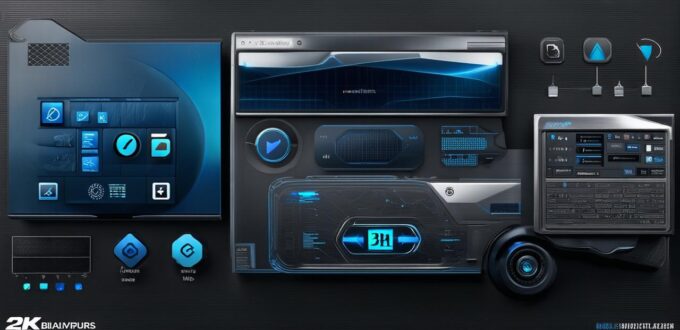
<h2>Operating Systems</h2>
<p>An operating system (OS) is a type of software that manages computer hardware and software resources. It serves as an interface between the user and the computer hardware and provides basic services required for computer operation.</p>
<p>Examples of modern operating systems include Windows, macOS, and Linux.</p>
<p>Operating systems are essential because they provide a consistent environment for running other software applications on the computer. They manage system resources such as memory, CPU time, and disk space, and ensure that these resources are used efficiently.</p>
<h2>Application Software</h2>
<p>Application software is designed to perform specific tasks or functions for end-users. Examples of application software include Microsoft Office (productivity), Photoshop (image editing), and Chrome (web browsing). Application software can be categorized into different types, such as productivity software, entertainment software, and educational software.</p>
<p>Application software is an essential part of our daily lives because it helps us accomplish tasks more efficiently. It can be installed on a computer or accessed through the internet and runs directly for end-users.</p>
<h2>Middleware</h2>
<p><h2>Middleware</h2> is a type of software that acts as a bridge between different software systems. It provides services such as data translation, communication protocols, and security management.</p>
<p><h2>Middleware</h2> enables different software systems to interact with each other seamlessly, regardless of their differences in language, architecture, or operating system.</p>
<h2>System Software</h2>
<p>System software is a type of software that manages the computer's operating system and other hardware resources. Examples of system software include device drivers, firmware, and utility programs. System software provides essential services such as memory management, input/output control, and error detection.</p>
<p>System software is crucial for ensuring that the computer operates efficiently and reliably. It enables hardware devices to communicate with each other and ensures that they work properly.</p>
<h2>Mobile Software</h2>
<p>Mobile software is a type of application software designed specifically for mobile devices such as smartphones and tablets. Mobile software can be categorized into different types, such as productivity apps, entertainment apps, and social media apps.</p>
<p>Mobile software is essential for businesses because it enables them to reach customers on the go and improve customer engagement. By providing a centralized platform for managing data and communication, middleware can improve collaboration and reduce errors.</p>
<h2>Case Studies and Personal Experiences</h2>
<h2>Example 1: Online Shopping</h2>
<p>Online shopping is an excellent example of how application software and middleware work together to provide customers with a seamless experience. When a customer visits an online store, they use an application software such as a web browser to interact with the website. The middleware on the server manages the communication between the web browser and the online store's database, ensuring that the customer's information is secure and their order is processed correctly.</p>
<h2>Example 2: Healthcare Management</h2>
<p>Healthcare management software is an excellent example of how system software and application software work together to improve patient care. In a hospital, system software such as device drivers and firmware manage the hardware devices and ensure that they work properly. Application software such as electronic health records (EHRs) and patient management systems provide healthcare providers with essential tools for managing patient information and improving patient outcomes.</p>
<h3>FAQs</h3>
<h3>Q: What is the difference between application software and middleware?</h3>
<p>A: Application software performs specific tasks for end-users, while middleware acts as a bridge between different software systems, enabling them to interact seamlessly.</p>
<h3>Q: Is operating system software an application?</h3>
<p>A: No, operating system software is not considered an application because it provides essential services that enable other software applications to run on the computer.</p>
<h3>Q: What are some examples of mobile software?</h3>
<p>A: Some examples of mobile software include productivity apps such as email clients and note-taking apps, entertainment apps such as music players and games, and social media apps such as Facebook and Instagram.</p>
<h3>Summary</h3>
<p>In conclusion, there are primary types of software that serve different functions and have unique characteristics. Operating systems manage computer hardware and software resources, application software performs specific tasks for end-users, middleware acts as a bridge between different software systems, system software manages the operating system and other hardware resources, and mobile software is designed specifically for mobile devices.</p>
<p>As technology continues to evolve, the types of software we use will also continue to change. It's essential for software developers to understand the different types of software and their roles in improving efficiency and collaboration across various industries. By leveraging these different types of software, businesses can streamline operations, improve customer engagement, and achieve their goals more efficiently.</p>

